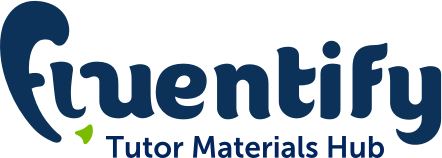As a Fluentify tutor, you probably have a conversation element to your classes before working on a language-point. But what if there were a way to practice a grammar point through speaking?
Well, there is and it’s called oral drills.
Oral drills are a method of teaching English that has been around for many years. It was formed from the idea that when we were babies, we learnt our native language, not from reading or gap-fill exercises, but from listening to the adults around us and repeating what they said.
What are oral drills?
An oral drill is either a question or statement carefully designed to get the student to reproduce the grammar point you are studying. They mimic how a person learns their native tongue, but in a condensed form.
It’s a powerful teaching tool that requires no materials from the tutor, only your voice. Let me explain how it works.
When to use oral drills
I don’t recommend spending the entire 30-minute session practising drills, because the student needs freer conversation to explore the language and work on their fluency.
However, a short, 5-10-minute drill activity adds a fun, high-energy element to your class and really helps a student focus on a particular language point.
Here are some great drills for your classes
The questions drill
Objective: To practice the interrogative form for different types of questions.
Most students do not feel comfortable asking questions in English because questions are difficult. Help your student become more confident with the interrogative form with this drill.
Instructions
The tutor says the answer to a question and asks the student what the question is. To help the student, I usually put the interrogative pronoun in the message thread so they know which type of question they are shooting for.
Next, ask your student the same question and then ask them to ask you something similar.
For example:
Tutor: ‘I go to the gym twice a week’, what is the question?
Student: How often do you go to the gym?
Tutor: Great, how often do you go to the gym?
Student: I go to the gym three times a week.
Tutor: Ask me a question with, ‘how often?’
Eight sentences for this drill (please feel free to make up some more).
- She has three cats – ‘How many cats does she have?’
- I go swimming twice a week – ‘How often do you go swimming?’
- It takes me 30 minutes to get to work in the morning – ‘How long does it take you to get to work in the morning?’
- I have been working for eight years – ‘How long have you been working for?’
- He is short with brown hair – ‘What does he look like?’
- It’s made of wood and glass – ‘What is it made of?’
- She was working with John – ‘Who was she working with?’
- She was responsible for the communications department – ‘What was she responsible for?’
The second conditional drill
Objective: Practice the second conditional.
Instructions
Give your students a statement that is not true for them. They have to turn it into a second conditional ‘if’ clause, and invent the second part.
For example,
Tutor: You know German.
Student: If I knew German, I would spend more time in Germany.
Tutor: Great, your sister is an airline pilot.
Student: If my sister were an airline pilot, I would get a discount on flights.
Six sentences for this drill (please feel free to make up some more).
- You play [insert instrument].
- You speak [insert language].
- You see a famous footballer in your local supermarket.
- Your brother/sister writes a best-selling novel.
- There is a marathon in your town.
- You forget your mother’s birthday.
You can extend this idea to practice ‘even if’ + second conditional.
For example:
Tutor: You are a vegetarian.
Student: Even if I were a vegetarian, I would still eat meat at Christmas.
Tutor: You have a Ferrari.
Student: Even if I had a Ferrari, I would never drive it because finding a secure parking spot is impossible.
Third conditional
You can also use this idea to practice the third conditional. This time simply say a sentence, but in past tense.
For example:
Tutor: Your grandmother wrote a best-selling novel.
Student: If my grandmother had written a best-selling novel, she would have been very happy.
Tutor: There was a hurricane last weekend.
Student: If there had been a hurricane last weekend, I would have stayed inside.
Six sentences for this drill (please feel free to make up some more).
- There was a snow storm last week
- Your parents had 10 children
- You went to Japan last week.
- You wore a red hat to work yesterday.
- Your mobile rang during an important meeting yesterday.
- You lost your keys yesterday.
The negative answers drill
Objective: Practice ‘any’ and ‘no’ pronouns. Use this drill to practice the difference between ‘anything’/‘nothing’, ‘anyone’/‘no one’, ‘anywhere’/ ‘nowhere’, ‘either’/‘neither’, ‘any’/‘none’/‘no.’
Instructions
The tutor asks a question and the student must answer in the negative, using both an ‘any’ and ‘no’ word where possible.
For example,
Tutor: Where did you go last night.
Student: I didn’t go anywhere.
Tutor: And the other way.
Student: I went nowhere.
Five drill sentences (please feel free to make up some more)
- Which of these two books have you read? (Hold up two books) – I haven’t read either/ I have read neither.
- What have you eaten today? – I haven’t eaten anything/ I have eaten nothing.
- Where has your boss gone this afternoon? – he/she hasn’t gone anywhere/ he/she has gone nowhere.
- How many cups did you break at the party? – I didn’t break any/ I broke none, I broke no cups.
- Who were you speaking to just now? – I wasn’t speaking to anyone/ I was speaking to no one.
These are just a few examples. There are in fact lots of drills out there for fun language practice in your sessions.
Interested in using oral drills in your sessions but want more information?
No problem, just contact me on Slack and we can meet for a half an hour one-on-one session on Fluentify to get you using drills with confidence.
Happy teaching!


One thought on “Discover the power of teaching grammar through speaking exercises”
Hats off to you Andromeda. This is a very useful post! Thanks for putting it together.